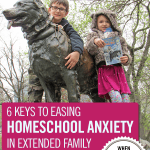
There’s something about going off the beaten path of education that causes anxiety and uncertainty. Even the most supportive and loving families may be unhappy when a mom or dad mentions homeschooling. Reactions may range from a raised eyebrow of shock to outright opposition. In the middle of those two extremes, you'll see a great deal of anxiety and worry.
Here are a few keys to ensure you provide the support and knowledge that grandmas, grandpas, aunts, and uncles need to feel at ease with your choice to homeschool. While it's not your role to manage their emotions and actions, there's a lot you can do to ease homeschool anxiety in extended family.
When you take these steps, you make your decision easier for them to swallow and reduce any friction in your relationships.
1. Pray
Prayer can never be underestimated. Before you make the decision to homeschool, spend time in personal prayer. Be sure you are submitting the desires of your heart to God’s will before you take the next step. After you feel the Lord nudging you to take that next step, spend more time in prayer with your spouse. Then, pray with your spouse and your children. Finally, take it to your extended family. Pray for hearts to be opened to the Lord’s will. Ask them to pray with you about homeschooling. Never take on homeschooling until the Lord has gone before you and prepared the way.
2. Understand the Concern
Chances are good that you’ve felt uncertain about homeschooling at some point as well. Maybe you have overcome the uneasiness, or maybe you are still dealing with it. Either way, put yourself in the shoes of your worried family members, and make sure they know that you can understand their uncertainty. Tell them that you will be happy to answer any questions. Let them know that you welcome their input, while respectfully reserving the right to make the final decision. Make sure to establish that you count on their support.
3. Invite Family Into Your Homeschool Regularly
The single biggest mistake a homeschool parent can make, in regards to family support, is to shut the family out. There is value in being open and transparent. We, as homeschoolers, can take a cue from public schools here. Public schools consistently open their doors to the community, inviting family in at every opportunity. We can do this in homeschool as well.
There are many ways to invite family into your homeschool. For example, last year, my mother-in-law came every Friday to teach a lesson from her area of expertise, music and food nutrition. My kids loved Grammy Fridays and looked forward to them each week. My father-in-law and my parents regularly stop by for impromptu science lessons or simply to give hugs and see what the kids are working on.
Local family is invited to our annual homeschool showcase. For our out-of-town family, we keep a Facebook page just for our homeschool where we share accomplishments and special projects. Transparency gives me a sense of accountability, and it puts family at ease, helping them know that you are taking your child’s education seriously.
4. Ask for Help
We cannot do this on our own. There will be areas where we are weak and need to ask for outside help. Before you look elsewhere, try looking to your family. Do you have anyone who might be willing to help?
- Maybe there is an uncle who would love to come walk your oldest child through the biology dissections.
- There may be a grandparent who would love to come listen to the kids learn to read.
- Maybe you could look over math curriculum options with your elementary school teacher mother-in-law.
Sometimes, grumbling is exacerbated by family members feeling useless. There is nothing quite like bringing in all your resources to create a complete, varied education for a child who is well-loved. If you think this is the case in your family, look for ways to ask family for help. Even if they can’t provide educational support, they could teach a skills-based lesson or make dinner for you during a busy week. You will be surprised by how much this small gesture can change things.
5. Gratefully Accept Constructive Critique
Everyone deals with critique in life. Coaches critique players, bosses critique employees, and rightfully so. This is a necessary part of life. Constructive criticism is how we grow. As homeschooling parents, we are not immune to critique. Rather, we should regularly submit ourselves to constructive critique from our spouses and trusted extended family members. Those who truly have the best interest of your children at heart should have a voice in your homeschool.
When my husband and I had just begun in children’s ministry, we invited a wise couple with experience to come see our service. After the service, they critiqued us quite heavily. I won’t lie—it hurt a little at the time, but as we reflected on their words and prayed in earnest, we realized that they spoke truth. Their motive was pure... love for us, our ministry, and the children under our care. We took their critique to heart and changed our ministry to reflect their wisdom. We almost immediately began to see the fruit from applying their wise suggestions.
That being said, you will also need to develop the ability to discern wise critique from foolish or unnecessary critique. We didn’t accept every bit of the critique that night. Some of it, we realized, just didn’t line up with the vision we felt God had given us for the ministry. So, we didn’t change the things that we saw were working on a weekly basis.
The same is true for homeschool parents. We should give family an opportunity to have a voice, but we must then discern what to take to heart, and what to kindly discard. Also understand that there is a difference between constructive critique and toxic critique. If you are dealing with the latter, you should distance yourself from that individual where possible.
6. Always Speak Positively About Family
“If you can’t say anything nice, don’t say anything at all.” We’ve all heard that saying, and those are wise words that we try to live by. Those words are especially true for family. I don’t think it’s appropriate for families to speak negatively about each other to or in front of the children. We make every effort to make sure that our children know how blessed they are to have so many people supporting and encouraging them.
Back when I was a teacher in public school and heard of someone choosing to homeschool, I , too, was very uncertain. So when I felt God calling us to homeschool, it took me a while to warm up to the idea. I continued to pray until I felt sure it was the right direction. I’m thankful that God demonstrated patience with me in this, and from a grateful heart, I try to give the same grace and patience to those in my life who are not quite warmed up to the idea. But let me encourage you, if you have a loving family, you are blessed. Give them time to adjust to the idea of homeschooling, pray for them, and involve them where possible. They could be one of your greatest allies in this homeschool journey.








